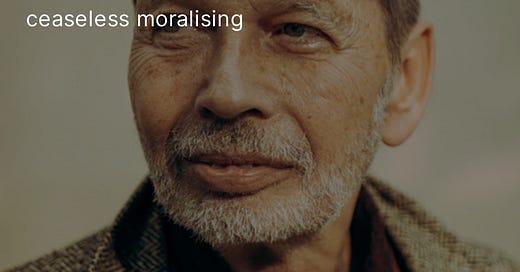Since the Olympics kicked off in Ancient Greece in 776 B.C., competitive sports have always been implicated in politics. However, it is one thing to attach sports to the rivalries and political disputes among Greek City states and quite another to be subjected to acrimonious disputes about what political cause should be advertised on the armbands of international footballers.
Every identity group with a beef about their victim status wants its concern to overshadow the World Cup in Qatar. ‘Qatar's women can’t work, study or travel without a man’s permission – where’s their armband’? asks Telegraph’s columnist Susanne Moore.
Competitive claims-making between rival groups of moral entrepreneurs has never appeared so hypocritical or grotesque as in the proceedings surrounding the World Cup. Historians will look back on November 2022 as the first-ever Virtue Signalling World Cup devoted to competitive virtue signalling.
Before the World Cup started, the West European football squads and their hangers-on assumed the manners and posture of sociology professors and campaigners. Football reporters appeared more interested in highlighting the injustices suffered by different groups in Qatari society than in talking about football. At times they seemed more concerned about the low pay of Qatar's migrant workers and the position of different groups of sexual minorities than the state of the football pitch and the organisation of the tournament.
The Australian football team produced a video highlighting Qatar's human rights abuses. All 16 players participated in the video, which attacked the ‘suffering’ of migrant workers and the inability in Qatar of LGBTQ people ‘to love the person that they choose’.
The Dutch took the initiative in Europe and organised the One Love campaign to promote inclusion and ‘send a message against discrimination’. Not to be outdone, ten football teams from Europe decided to get on board and undertook to wear One Love’s rainbow armband. Like the Dutch, the English Football Association also decided to ‘send a message’ to Qatar. In retrospect, it is evident that Britain came first in the hypocrisy stake. The British media ceaselessly reminded Qatar of its moral inferiority and never ceased to lecture this nation about the need to sort out its economic and cultural crimes against humanity.
At times the impulse to find fault with Qatar became its caricature. Listening to the BBC’s relatively highbrow Today Programme on the morning when the Government of Qatar announced that it would ban the sale of alcohol inside stadiums was a surreal experience. Suddenly the cause of drinking beer in a Muslim country vied for attention with the plight of low-paid migrants and LGBTQ+ sexual minorities. For a while, it seemed that the cause of alcoholic minorities would be promoted alongside those of oppressed sexual minorities in Qatar. Listeners of this radio programme would wait in vain for someone to point out that drinking alcohol is not customary in a Muslim society.
The World Cup organisers of the tournament decided to indulge the hypocrisy of the English team’s organisers. Under the glare of international publicity, it selected a group of migrant workers to ‘train’ with the English squad. Since it made for good public relations, all sides were happy with this ‘message’ against discrimination.
The English team, which went out of its way to demonstrate to the world that it was on the right side of history, eventually decided that playing football was more important than sending a message. The England team’s captain, Harry Kane, was supposed to lead the charge against discrimination in Qatar. That is until England’s first game kicked off, and the One Love symbol was conspicuously absent on Kane’s arms. When FIFA, the organisers of the World Cup, indicated that the wearing of the armband would invite the referee to give Kane a yellow card, the English team decided that since it had already made it clear that it loved One Love, it could now, with grace, back down.
All it took was the threat of a yellow card for the English team to cave in. To limit the humiliation of being seen to back down after so much talk, England coach Gareth Southgate declared that his team would resume taking the knee. The taking of the knee has become the go-to performance of virtue associated with Southgate. However, not even the most zealous practitioner of this ritual could explain what all this had to do with Qatar.
The truth is that none of the nonsense surrounding the One Love crusade had anything to do with Qatar. Western gesture politics is about convincing people at home that their society occupies the moral high ground. But when the countries of the west seek to morally rehabilitate themselves through lecturing tiny Qatar, it becomes evident that it is the West that has lost its way.
If they were genuinely concerned about the internal affairs of Qatar, the agitated football teams could have stayed at home.
Running Commentary
No sooner was tho commentary posted before I heard that Japan beat the German team 2-1. I am totally delighted since before the match started the German team lined up and in a gesture of performative defiance of Qatar, placed their hands over their eyes. So while the Germans performed virtue - the Japanese performed on the field!!!





I can understand your reaction. As a season ticket holding Spurs fan I find all this stuff nauseating - especially the way that the England team has been repackaged as pin up boys for the so-called diversity and inclusion agenda. However we can't let them have their way and I love football too much to abandon it. I was delighted when a couple of days after Spurs fans were instructed not to to chant Yid Army, everybody chanted it throughout the match.
I'm afraid that the gesture of taking the knee has turned me away from the England team in particular and football in general. And it was the only sport I ever played, the only sport I ever followed.